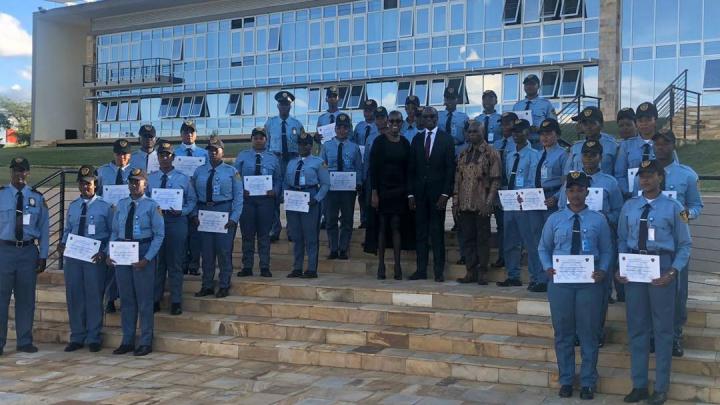The Mechanism welcomes 30 newly recruited security officials in its Arusha branch
On Thursday, 7 November 2019, the International Residual Mechanism for Criminal Tribunals (“Mechanism”) organised a graduation ceremony for 30 newly recruited Security Officers. During this official ceremony, the Registrar, Mr. Olufemi Elias welcomed and congratulated the new Security Officers. Speaking at the event, the Registrar reiterated the importance he, under the delegated authority from the United Nations Secretary General, attaches to gender parity and proudly announced that the Mechanism has achieved gender parity within the Security and Safety Section.
Prior to their graduation, the Security Officers went through a competitive recruitment process after being selected from various Tanzanian law enforcement agencies, including Diplomatic and Regional Police, as well as the Prison Services and Immigration Department. They underwent an intensive induction training programme: the mandatory Division of Headquarters Security and Safety Services DHSSS Security Officer Induction Training Course. This course is mandatory for all security officers hired by the UN Security and Safety Services before officers commence their official duties as Security Officers.
The Officers who graduated today now form part of the 11 DHSSS duty stations located in Addis Ababa, Arusha, Bangkok, Beirut, Geneva, Nairobi, New York, Phnom Penh, Santiago, The Hague and Vienna.
Out of the 30 new recruits, 25 of them are female. This trend that was witnessed during the September 2019 graduation of 17 recruits 15 of whom were female. This is as a direct result of the Gender Initiative Challenge conducted by Security and Safety Services in Arusha in 2018, a programme that received recognition and was commended by the UN Department of Safety and Security. With these new recruitments, the Mechanism Management has once again demonstrated the importance it attaches to gender parity by welcoming these new cadets, 90% of whom are female.

On Thursday, 7 November 2019, the International Residual Mechanism for Criminal Tribunals (“Mechanism”) organised a graduation ceremony for 30 newly recruited Security Officers. During this official ceremony, the Registrar, Mr. Olufemi Elias welcomed and congratulated the new Security Officers. Speaking at the event, the Registrar reiterated the importance he, under the delegated authority from the United Nations Secretary General, attaches to gender parity and proudly announced that the Mechanism has achieved gender parity within the Security and Safety Section.
Prior to their graduation, the Security Officers went through a competitive recruitment process after being selected from various Tanzanian law enforcement agencies, including Diplomatic and Regional Police, as well as the Prison Services and Immigration Department. They underwent an intensive induction training programme: the mandatory Division of Headquarters Security and Safety Services DHSSS Security Officer Induction Training Course. This course is mandatory for all security officers hired by the UN Security and Safety Services before officers commence their official duties as Security Officers.
The Officers who graduated today now form part of the 11 DHSSS duty stations located in Addis Ababa, Arusha, Bangkok, Beirut, Geneva, Nairobi, New York, Phnom Penh, Santiago, The Hague and Vienna.
Out of the 30 new recruits, 25 of them are female. This trend that was witnessed during the September 2019 graduation of 17 recruits 15 of whom were female. This is as a direct result of the Gender Initiative Challenge conducted by Security and Safety Services in Arusha in 2018, a programme that received recognition and was commended by the UN Department of Safety and Security. With these new recruitments, the Mechanism Management has once again demonstrated the importance it attaches to gender parity by welcoming these new cadets, 90% of whom are female.